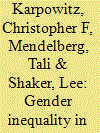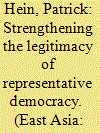|
|
|
Sort Order |
|
|
|
Items / Page
|
|
|
|
|
|
|
| Srl | Item |
| 1 |
ID:
131520


|
|
|
|
|
| Publication |
2014.
|
| Summary/Abstract |
When and why do women gain from increased descriptive representation in deliberating bodies? Using a large randomized experiment, and linking individual-level speech with assessments of speaker authority, we find that decision rules interact with the number of women in the group to shape the conversation dynamics and deliberative authority, an important form of influence. With majority rule and few women, women experience a negative balance of interruptions when speaking, and these women then lose influence in their own eyes and in others'. But when the group is assigned to unanimous rule, or when women are many, women experience a positive balance of interruptions, mitigating the deleterious effect of small numbers. Men do not experience this pattern. We draw implications for a type of representation that we call authoritative representation, and for democratic deliberation.
|
|
|
|
|
|
|
|
|
|
|
|
|
|
|
|
| 2 |
ID:
121129


|
|
|
|
|
| Publication |
2012.
|
| Summary/Abstract |
Can men and women have equal levels of voice and authority in deliberation or does deliberation exacerbate gender inequality? Does increasing women's descriptive representation in deliberation increase their voice and authority? We answer these questions and move beyond the debate by hypothesizing that the group's gender composition interacts with its decision rule to exacerbate or erase the inequalities. We test this hypothesis and various alternatives, using experimental data with many groups and links between individuals' attitudes and speech. We find a substantial gender gap in voice and authority, but as hypothesized, it disappears under unanimous rule and few women, or under majority rule and many women. Deliberative design can avoid inequality by fitting institutional procedure to the social context of the situation.
|
|
|
|
|
|
|
|
|
|
|
|
|
|
|
|
| 3 |
ID:
140668


|
|
|
|
|
| Publication |
New York, Orbis Books, 1974.
|
| Description |
xii, 177p.hbk
|
| Standard Number |
0883444356
|
|
|
|
|
|
|
|
|
|
|
|
Copies: C:1/I:0,R:0,Q:0
Circulation
| Accession# | Call# | Current Location | Status | Policy | Location |
| 017807 | 968.9104/KAP 017807 | Main | On Shelf | General | |
|
|
|
|
| 4 |
ID:
141752


|
|
|
| 5 |
ID:
098384


|
|
|
|
|
| Publication |
2010.
|
| Summary/Abstract |
bureaucracy, who acts on behalf of the executive, and party councils. Moreover bureaucrats bypass the legislative Diet process by making rules themselves. This is problematic because it is the lawmakers who are directly held accountable by voters for the enacted legislation risking to be eventually voted out of office. It is suggested that under the given circumstances of strict party discipline, drafting of bills by the bureaucracy and endorsement by party councils, the formal majority rule alone is not sufficient to justify legislative outcomes. The legitimacy factor is introduced to verify in how far individual lawmakers are enabled to initiate and draft floor bills by themselves, discuss bill contents in plenary deliberations and get the public opinion involved. The article attempts to demonstrate that bipartisan floor bills reflect the quest for parliamentary legitimacy and equality among lawmakers across party boundaries. It is suggested that the more legislators participate in drafting and discussing a bill the more legitimate the outcome becomes. The paper screens to this effect several bipartisan bills submitted to the Diet of Japan. Bills such as the NPO law, the law to ratify the Rome Statute for the accession to the ICC, the law to prevent suicide and the law to implement internet filters to protect children are the result of cooperation among lawmakers trying to constrain the interference of the executive or of the powerful bureaucracy. The participation of non-parliamentary agents taking an active part in the legislative process has enhanced the dynamics of representative democracy as well. In the decades of radical ideological confrontation in the 1950s, 60s, and 70s the majority rule risked to become an instrument of coercion. The opposition was compelled to resort to anti-parliamentary obstructionist tactics to derail majority legislation that was rammed through parliament without sufficient plenary deliberation and without taking into account the concerns or viewpoints of the minority. Obstructionism decreased with the LDP co-optation of opposition parties to government responsibility in the 1990s. Opposition for the sake of opposition (communists, DPJ until 2006) and governing for the sake of governing (SDPJ, Komei) have not been honored by the voters. After 2007 the DPJ started to refocus its policies more on ideological differentiation and managed to beat the LDP in the 2009 elections. Recently the work of the Diet has been increasingly put under the scrutiny of international NGOs and legislatures abroad. The unresolved controversial comfort women issue suggests that omission to pass appropriate and timely reconciliatory legislation can cause a serious loss of parliamentary institutional esteem and respect.
|
|
|
|
|
|
|
|
|
|
|
|
|
|
|
|
|
|
|
|
|